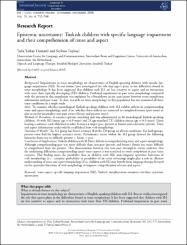| dc.contributor.author | Yarbay Duman, Tuba | |
| dc.contributor.author | Topbaş, Seyhun | |
| dc.date.accessioned | 10.07.201910:49:13 | |
| dc.date.accessioned | 2019-07-10T19:56:42Z | |
| dc.date.available | 10.07.201910:49:13 | |
| dc.date.available | 2019-07-10T19:56:42Z | |
| dc.date.issued | 2016 | en_US |
| dc.identifier.citation | Yarbay Duman, T. ve Topbaş, S. (2016). Epistemic uncertainty: Turkish children with specific language impairment and their comprehension of tense and aspect. International Journal Of Language & Communication Disorders, 51(6), 732-744. https://dx.doi.org/10.1111/1460-6984.12244 | en_US |
| dc.identifier.issn | 1368-2822 | |
| dc.identifier.issn | 1460-6984 | |
| dc.identifier.uri | https://dx.doi.org/10.1111/1460-6984.12244 | |
| dc.identifier.uri | https://hdl.handle.net/20.500.12511/2792 | |
| dc.description | WOS: 000387125300009 | en_US |
| dc.description | PubMed ID: 27074978 | en_US |
| dc.description.abstract | BackgroundImpairments in tense morphology are characteristic of English-speaking children with specific language impairment (SLI). Recent studies have investigated the role that aspect plays in the difficulties found in tense morphology. It has been suggested that children with SLI are less sensitive to aspect and its interaction with tense than typically developing (TD) children. Profound impairment in past tense morphology compared with the present in this population was explained by a breakdown in the association between event completion information and past tense. To date, research on tense morphology in this population has not examined all three tense conditions in a single study. AimsTo examine whether monolingual Turkish-speaking children with SLI exhibit deficits in comprehending tense and aspect morphology, and, if so, whether these deficits are restricted to completed events (past tense) or also occur for incomplete non-past events (future and present tense). Methods & ProceduresA sentence-picture matching task was administered to 36 monolingual Turkish-speaking children: 13 with SLI (mean age = 6;9 years) and 23 age-matched TD children (mean age = 6;5 years). Upon hearing a sentence, each child had to select between a target (past, present or future) and a distracter picture. Tense and aspect information could only be established from verb morphology. Outcomes & ResultsThe SLI group had lower accuracy than the TD group on all test conditions. For both groups, present tense had the highest accuracy scores. Performance scores within the SLI group showed the following hierarchy from easy to difficult: present > future > past. Conclusions & ImplicationsTurkish children with SLI have deficits in comprehending tense and aspect morphology. Although comprehending past was more difficult than non-past (present and future), future was more difficult to comprehend than the present. This disassociation between two non-past incomplete events indicates that the underlying difficulties comprehending (past) tense-aspect is not restricted to event completion in past tense contexts. This finding raises the possibility that in children with SLI, non-temporal epistemic functions of verb morphology (i.e., certainty, probability or possibility of an event occurring) might play a role in efficient understanding of tense and aspect morphology. If so, children with SLI may benefit from language therapy focused on the epistemic functions of verb morphology to improve comprehension of tense and aspect. | en_US |
| dc.description.sponsorship | Veni Research Grant of the Netherlands Organization for Scientific Research (NWO) [016.114.065] | en_US |
| dc.description.sponsorship | This research was supported by a Veni Research Grant of the Netherlands Organization for Scientific Research (NWO) (Grant Number 016.114.065) to the first author. The authors thank all the children and their parents as well as the staff at the rehabilitation centres/clinics and schools for being part of this study. They also thank Ayhan Aksu-Koc, (Bogazici University, Turkey) for her invaluable discussions on the acquisition of tense, aspect and modality in Turkish. The authors are grateful for the suggestions and comments of two anonymous reviewers, which helped the authors to improve their ideas a great deal. | en_US |
| dc.language.iso | eng | en_US |
| dc.publisher | Wiley | en_US |
| dc.rights | info:eu-repo/semantics/openAccess | en_US |
| dc.subject | Tense | en_US |
| dc.subject | Aspect | en_US |
| dc.subject | Specific Language Impairment (SLI) | en_US |
| dc.subject | Turkish | en_US |
| dc.subject | Morphosyntax-Semantics Interface | en_US |
| dc.subject | Epistemic Uncertainty | en_US |
| dc.title | Epistemic uncertainty: Turkish children with specific language impairment and their comprehension of tense and aspect | en_US |
| dc.type | article | en_US |
| dc.relation.ispartof | International Journal of Language & Communication Disorders | en_US |
| dc.department | İstanbul Medipol Üniversitesi, Sağlık Bilimleri Fakültesi, Dil ve Konuşma Terapisi Bölümü | en_US |
| dc.identifier.volume | 51 | en_US |
| dc.identifier.issue | 6 | en_US |
| dc.identifier.startpage | 732 | en_US |
| dc.identifier.endpage | 744 | en_US |
| dc.relation.publicationcategory | Makale - Uluslararası Hakemli Dergi - Kurum Öğretim Elemanı | en_US |
| dc.identifier.doi | 10.1111/1460-6984.12244 | en_US |
| dc.identifier.wosquality | Q1 | en_US |
| dc.identifier.scopusquality | Q1 | en_US |


















